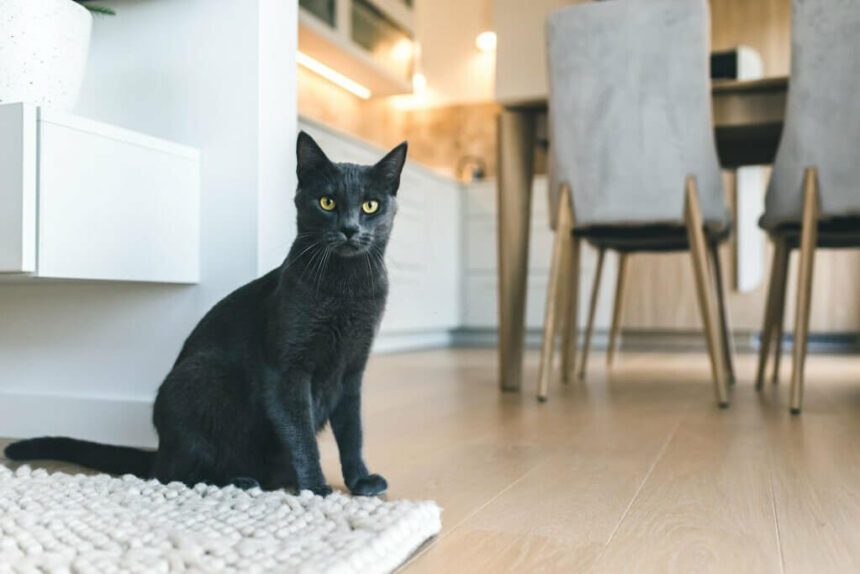If you’re a devoted cat owner, you’ve probably noticed this peculiar phenomenon – your feline friend is a perpetual food beggar, always yearning for more, yet remains surprisingly slim. This leaves you pondering the enigma: “Why is my cat always hungry but skinny?” The truth behind this behavior lies in various factors, from medical conditions to dietary habits and natural instincts. By the end, you’ll have a better understanding of why your furry friend might be acting like a ravenous little vacuum yet not packing on the pounds.
Why Is My Cat Always Hungry But Skinny?
Here, we’ll unravel the seven potential reasons behind your cat’s endless appetite and svelte physique.
The Skinny on Cat Nutrition
First, let’s talk about nutrition. Cats are obligate carnivores, meaning they need a diet rich in animal protein to thrive. Unlike us, they can’t just snack on a salad or munch on some fruit for their vitamins. They need meat, and plenty of it. If your cat is always hungry, it might not be getting the right balance of nutrients, particularly protein.
Protein Deficiency
Protein is the building block for muscle, skin, fur, and overall health. If your cat isn’t getting enough, it will start to lose weight, even if it’s eating plenty.
The Food and Drug Administration (FDA) recommends an average of 18% protein in an adult cat’s diet. While this might sound like a lot, most commercial cat foods surpass this with 20-25% protein content.
Most commercial cat foods should provide enough protein, but some cheaper brands might not. Check the label on your cat’s food. Is it high in animal protein? If not, you might need to switch to a higher-quality brand.
Tips to Ensure Your Cat Gets Enough Protein:
- Opt for premium cat food brands that list animal protein as the first ingredient.
- Avoid foods that are heavy on grains and fillers.
- Consider supplementing with wet food or raw diets, but consult your vet first.
Medical Conditions That Cause Weight Loss and Increased Appetite
If your cat is scarfing down food like there’s no tomorrow yet remains skinny, it could be dealing with an underlying medical issue. Here are some common culprits:
Hyperthyroidism
Hyperthyroidism occurs when your cat’s thyroid gland produces too much thyroid hormone. This speeds up their metabolism, causing them to burn through calories faster than they can consume them. Symptoms include weight loss, increased appetite, hyperactivity, and sometimes vomiting or diarrhea.
Signs of Hyperthyroidism:
- Rapid weight loss despite increased appetite
- Increased thirst and urination
- Restlessness or hyperactivity
- Vomiting and diarrhea
Diabetes
Diabetes in cats is somewhat similar to diabetes in humans. It happens when your cat’s body can’t properly use insulin, leading to high blood sugar levels. This can cause increased hunger because the body isn’t getting the energy it needs from the food being consumed.
Diabetes Symptoms:
- Weight loss despite increased food intake
- Increased thirst and urination
- Lethargy and weakness
- Sweet-smelling breath (in severe cases)
Malabsorption Disorders
Sometimes, your cat’s body might not be absorbing nutrients properly, even if it’s eating a balanced diet. Conditions like inflammatory bowel disease (IBD) or pancreatic insufficiency can interfere with nutrient absorption, leading to weight loss and a constant feeling of hunger.
Symptoms of Malabsorption:
- Chronic diarrhea
- Weight loss despite normal or increased appetite
- Poor coat condition
- Frequent bowel movements
Dental Problems
If your cat has dental issues, eating can become painful, leading them to eat less or only eat soft food. Dental problems can cause weight loss and increased hunger because your cat isn’t getting enough food due to the pain.
Common Dental Issues in Cats:
- Gum disease
- Tooth decay
- Broken or loose teeth
- Abscesses
How to Spot Dental Problems:
- Bad breath
- Drooling
- Pawing at the mouth
- Reluctance to eat or preference for soft foods
Parasites
Parasites like worms can also cause weight loss and increased appetite. These nasty critters steal nutrients from your cat’s food before it can be absorbed, leaving your cat hungry and malnourished.
Common Parasites in Cats:
- Roundworms
- Tapeworms
- Hookworms
Symptoms of Parasite Infestation:
- Weight loss
- Increased appetite
- Vomiting and diarrhea
- Visible worms in feces or around the anus
Psychological and Behavioral Issues
Believe it or not, cats can suffer from psychological issues just like humans. Anxiety, stress, or even boredom can lead to increased hunger and weight loss. Cats might eat out of anxiety or because they’re bored, but if they’re also experiencing stress, they might not be absorbing the nutrients properly.
Anxiety and Stress
Cats are creatures of habit. Any disruption to their routine can cause stress. Moving to a new home, introducing a new pet, or even rearranging the furniture can make your cat anxious. This can lead to changes in appetite and weight.
Signs of Anxiety in Cats:
- Excessive grooming or scratching
- Hiding or avoiding interaction
- Increased vocalization
- Changes in litter box habits
How to Help Your Hungry but Skinny Cat
So, what can you do to help your skinny, always-hungry cat? Here are some steps you can take:
Consult Your Vet
First and foremost, take your cat to the vet for a thorough checkup. Blood tests, fecal exams, and possibly X-rays or ultrasounds can help diagnose any underlying medical conditions.
Improve Their Diet
Make sure your cat is getting a high-quality, protein-rich diet. You might need to switch to a premium brand or even consider a raw diet. Always consult your vet before making any significant changes to your cat’s diet.
Regular Parasite Control
Keep up with regular deworming treatments and check-ups. Even indoor cats can get parasites, so it’s essential to stay on top of their health.
Provide Mental and Physical Stimulation
Make sure your cat has plenty of toys and opportunities for play. Interactive toys, puzzle feeders, and regular playtime can help reduce anxiety and boredom.
Address Dental Issues
Regular dental check-ups and cleanings are crucial. If your cat has dental problems, your vet can provide treatment and advice on how to manage their condition.
Manage Stress and Anxiety
Create a calm and stable environment for your cat. Provide hiding spots, avoid major changes in their routine, and consider using calming aids like Feliway diffusers.
Why Does My Cat Eat A Lot But Not Gain Weight?
The answer is surprisingly straightforward: overfeeding. Many cat owners tend to indulge their pets, offering unlimited food without considering their cat’s actual nutritional needs. Cats that appear underweight despite increased food intake are often dealing with underlying medical issues or behavioral concerns.
Overeating can be linked to boredom or psychological issues, which may lead cats to consume more food than required. While an underweight cat might not raise immediate alarm bells, monitoring your pet’s weight and food intake is essential.
Why Is My Old Cat Always Hungry But Skinny?
It’s a valid concern, especially considering that older cats often exhibit thinner physiques. If your senior feline consistently craves food yet remains thin, it’s likely due to an underlying medical condition impeding their weight gain. Numerous medical issues can result in appetite loss in older cats, and some may persist even after the initial problem is resolved. If your cat is losing weight and shows no signs of illness, it could be boredom or a psychological issue. Consulting a veterinarian can provide clarity on your cat’s condition.
Final Thoughts
Figuring out why your cat is always hungry but skinny can be a bit of a puzzle. It’s crucial to approach this issue from multiple angles, considering both medical and behavioral factors. By working closely with your vet and paying attention to your cat’s needs, you can help them achieve a healthy weight and live a happier life.
Remember, every cat is unique. What works for one might not work for another. It’s all about finding the right balance and ensuring your feline friend gets the care and nutrition they need. Keep an eye on their health, make adjustments as needed, and provide lots of love and attention. Your cat will thank you with purrs and affection, showing you just how much they appreciate your efforts.
So, if you’re dealing with a cat that’s always hungry but skinny, don’t panic. There are plenty of solutions to explore, and with the right approach, you can get your kitty back on track. Good luck, and may your feline friend soon be healthy, happy, and well-fed!



